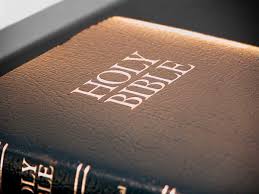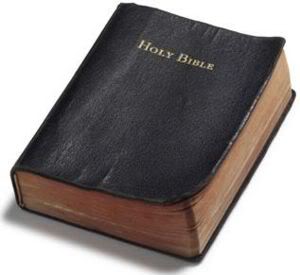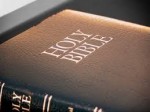If you look on the front cover of your Bible, you are likely to see this:

Such wording is so commonplace, we hardly think anything of it.
But are you aware that the concept of the Bible being holy is not found at all in the Old Testament and is rarely applied to the Bible in the New Testament, and even then, in places where the usage is debatable.
Let me put it another way: God is Holy; the Bible is not.
Thinking and speaking about the Bible as “holy” is one reason the Bible has come to be viewed as the fourth member of the Trinity in the minds of many Christians.
The Holy Bible in Jewish Literature
It is true that Jewish Rabbinic writers often wrote about “the Holy Scriptures,” but it is also true that many Rabbinic writers could be accused of almost deifying the Bible. A Torah scroll, for example, often costs tens of thousands of dollars, and is kept in an expensive container, and if it is ever dropped on the ground or touched with something (or by someone) unclean, it has to be cleansed or buried (but not burned or thrown out).
But this is not how Christians view the Bible (some do, actually, but that is a side topic).
But this Rabbinic reverence for the Scriptures comes not from the Hebrew Scripture itself, but from Jewish tradition that is built up around the Scripture.
The Holy Bible in the New Testament
The same argument could be made for the New Testament.
There are only three places in the New Testament that seem to indicate that the Bible is “holy.”
 The first is Romans 1:2, but there the word Paul uses for “holy” is hagiais instead of the normal word for divine holiness, hierais. The same usage applies to Romans 7:12 where Paul speaks of the “holy law.”
The first is Romans 1:2, but there the word Paul uses for “holy” is hagiais instead of the normal word for divine holiness, hierais. The same usage applies to Romans 7:12 where Paul speaks of the “holy law.”
There is only one place in the New Testament that uses the normal term “holy” (hieros) in connection to Scripture, and that is 2 Timothy 3:15.
But curiously, the word Paul uses there for Scripture is grammata, not the more typical words for Scripture, biblos or graphe. Why does it matter? Because elsewhere in Paul’s writings, he usually contrasts grammata with pneuma. In other words, the writings of the Law are set in contrast to life in the Spirit (cf. Rom 2:27).
So it appears that in Paul’s thinking, gramma does not refer to the Bible or the Scriptures, but to the prescriptions and commands of the Law (see TDNT I:765). The gramma is the Law which does not rule in the heart (Rom 7:6; 2 Cor 3:6ff.; TDNT I:766).
It seems then, that the only place in the Bible which speaks about the “Holy Writings,” Paul is writing somewhat about the Jewish religious view of the Law, a view in which he was taught and trained (as was Timothy), but which is proved to be untrue in light of the revelation in Jesus Christ.
As a curious side note, Paul uses a different word for Scripture in 2 Timothy 3:16 (graphe), and a third word in 2 Timothy 4:2 (logos). My personal belief is that Paul was not simply using synonyms to refer to the Bible, but was using three different terms to make a specific point about what Timothy should focus on in ministry (Answer: Jesus – The Logos).
Jesus and the Holy Spirit Transcend the Bible
So regarding the Bible, I agree with what Schrenk writes in TDNT:
“We may thus conclude that the phrase [the holy writings] perpetuates in the church a Jewish and Hellenistic rather than a specifically early Christian usage” (TDNT I:751). “For Paul, the [law] and [writings] are transcended by Christ and the Spirit, and are thus given their true validity” (TDNT I: 761).
and for a statement that really blows me away:
“For early Christianity Scripture is no longer just what is written, nor is it just tradition; it is the dynamic and divinely determined declaration of God which speaks of His whole rule and therefore of His destroying and new creating, and which reaches its climax in the revelation of Christ and the revelation of the Spirit by the risen Lord … The full revelation in Christ and the Spirit is more than what is written” (TDNT I:761).
A few days after I originally wrote this article, I saw that Brandon Chase was thinking and writing about something similar. At one point, Brandon writes this:
So much effort is spent on driving Christians to be in the Word more, to read their Bible’s more, to study the Bible… You know what? Some of you… Some of you need to put your Bible down. You need to walk away. Take a break. Look for and find God’s Word (Jesus Christ) in nature, people, rest, quiet. Learn to hear His Voice apart from the words in your Bible.
You really need to go read his post, and while you are at it, subscribe to his blog. His posts are fantastic!




Saying the Bible is holy doesn’t mean that we worship it. Any thing “of God” is holy and that includes his Scriptures.
Revelation was oral, then safeguarded in writing. His words are God-breathed. 2 Tim 3:16. His words are holy. Just my thoughts.
Love your thoughts on this Jeremy. Thank you. And thank you for including some of mine. I appreciate you.
Just read the article. Interesting.
Ockert, everything is of God. Would you mind if I started talking about holy trees and the holy sun?
hahahaha.. you are very funny Jeremy 🙂
Ponder on what Daoists mean by the term 道.
And on its diffusion.
It will ruin your idea of segregating the holy and sacred from the profane and vulgar.
Reminds me of John 5:39-40.
Jeremy, your thoughts echo the issues Karl Barth had. For instance, if you take John 1:1 and substitute “the Word” with “the Bible” the whole sentence and the entire introduction of John would make no sense, i.e., “in the beginning was [the Bible] ” is nonsensical. Simply I honor the source of the Bible meaning that it is generally where God choses to meet people in terms of revelation but it is not the only place nor the only way that God reveals himself.
Hey, did you hear about the New Trinity? The Father, the Son and The Holy Bible. …. The Bible is not Holy, The WORD is Holy. The Word is Jesus. The Bible is Scripture.
Alexey, I am not an atheist either. But I don’t worship the Holy Bible, I worship the Holy God.
Strange as it may sound, The Holy Book doesn’t bother me at all. Maybe because “bible” is no longer associated with “book” and has become it’s own entity.
Under the whole Scriptures some things were designated either by devotion or election as set apart to God. These things included time (holy days) people (such as the Levites), food (sacrifices), clothes (clothes of the priests). These things were/are kodesh (holy) rather than hol (or common.) Profaning anything holy always resulted in death.
Whilst God created the heavens and the earth, they are not ever designated as inherently holy.
Whilst it is important not to confuse the God of the book with the book, God has designates this profound and peculiar book as being part of our relationship with him. I am greatly cautious of these strange distinctions that people try to draw from the orthodox self-revelation of God and the self-revealed revelations that people project onto God.
By “heavens and earth” I refer to sky, sun, stars etc rather than the spiritual heavens.
The first thought that came to mind was 1 Corinthians 2:14:
“The natural person does not accept the things of the Spirit of God, for they are folly to him, and he is not able to understand them because they are spiritually discerned.”
I think that every Bible should have a big “STOP” sign on the first page along with that passage of scripture letting the reader (or potential reader) know that this book is not for everybody, but only for those that have been enabled by God to read and understand it. It has been my personal experience that I wrestled to understand the Bible all my life and it only came alive when I was saved and the Holy Spirit opened my eyes, ears, and heart to understand it. In that sense I would say that the Bible is “holy”, or set aside only for those that God has enabled to read, hear and understand it. Revere it as an icon? Publicly burn a Bible alongside a Koran and compare/contrast the reactions.
Why is regarding the Bible or the Scriptures as “Holy” so distasteful. I was always taught that the bible was the “word” of God and that Jesus was the “Logos” living word. Maybe I do not understand something correctly. If my thinking is correct, what’s wrong with thinking or referring to the bible or scriptures as Holy?
Cam,
It’s not distasteful exactly, except when it borders on idolatry.
What’s wrong with thinking of the trees, the sun, the earth, the rivers, all of creation as God-given, holy and sacred? Maybe if we did, we wouldn’t be in such a hurry to exploit, pillage and rape this planet.
Yes, maybe so. I suppose I don’t mind saying that “everything is holy.” I really don’t like the so-called division between “sacred” and “secular.” I think I have written before that everything is sacred, which means “set apart, holy.”
Thank you. And you know what, after my revelation of GRACE last year which absolutely set me free from ‘performance Christianity’ God told me that, regardless of what ‘scriptures’ people threw at me, what He was telling me directly to my heart, that He has made me perfectly righteous by the blood of His son regardless of what I do or don’t do, I must trust His voice in my heart, more than the printed ‘Word’ which has been bended, bent, misterpreted and mistaught.
I hope you don’t mind me posting this from my blog I wrote a while ago: Is God a book or a person?
http://steveedwardsthoughts.wordpress.com/2012/10/17/is-god-a-book-or-a-person/
Thanks for adding a link to your post. I don’t mind at all! Love it. Hopefully people come over and read what you wrote.
Jeremy, thank you for this thought provoking post.
I think the question is more to what we mean or understand by the word “holy”. To my understanding it means “set apart for the use or service of God” (1Tim2:21, 1Co1:2, Eph1:4.) Not all humans are holy, but we are called to be holy. In that way the Bible is holy, set apart while the trees, sun etc. are not, for they fulfill a different role.
Heb.12:14 “Make every effort to live in peace with all men and to be holy; without holiness no one will see the Lord.”
Just as all people God created, are not holy, but Children of God are, not all books are holy, but the Bible is set apart for and to the glory of God. In that way I cannot but render the Bible HOLY.
Yet if one understands the word “holy” to mean some untouchable thing having some kind of holiness by itself, then I agree that the Bible does not have that kind of “holiness” That belongs only to the Trinity, not even to us who are expected to be holy.
God bless,
Herman
Good points, Herman. It really does depend on how you understand the word “Holy.” I may not have made that as clear as I could have in the post.
For the word of God is living and active and sharper than any two-edged sword, and piercing as far as the division of soul and spirit, of both joints and marrow, and able to judge the thoughts and intentions of the heart. (Hebrews 4:12 NAS)
For the word of the cross is to those who are perishing foolishness, but to us who are being saved it is the power of God. (1Corinthians 1:18 NAS)
And Philip opened his mouth, and beginning from this Scripture he preached Jesus to him. (Act 8:35 NAS)
The Bible is more than ink on a page, more than a collection of words, more than history and poetry. It is the word of God and the power of God. We get in trouble when we set it aside and listen to other sources. The Bible speaks to us just as it did to the Ethiopian eunuch. Philip didn’t tell him to put it down and go look to nature or man for the answers to your questions.
△ ▽
I just wish people could understand the bible more and know what diferrent ones Have the Word Holy on them?